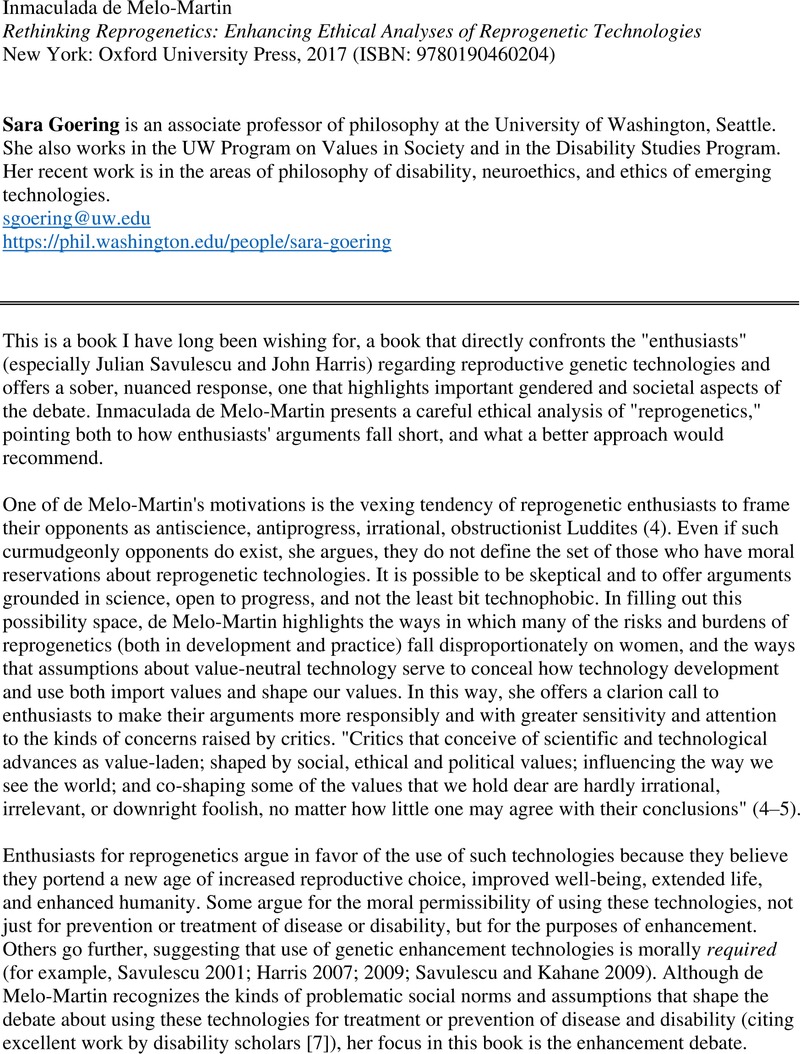No CrossRef data available.
Article contents
Inmaculada de Melo-Martin, Rethinking Reprogenetics: Enhancing Ethical Analyses of Reprogenetic Technologies. New York: Oxford University Press, 2017, ISBN 9780190460204
Published online by Cambridge University Press: 01 October 2021
Abstract
An abstract is not available for this content so a preview has been provided. As you have access to this content, a full PDF is available via the ‘Save PDF’ action button.

- Type
- Book Review
- Information
- Copyright
- Copyright © Hypatia, Inc., 2017
References
de Melo-Martin, Inmaculada. 2004. On our obligation to select the best children: Reply to Savulescu. Bioethics 18 (1): 72–83.10.1111/j.1467-8519.2004.00379.xCrossRefGoogle ScholarPubMed
de Melo-Martin, Inmaculada 2005. Taking biology seriously: What biology can and cannot tell us about moral and public policy issues. Lanham, Md.: Rowman & Littlefield.Google Scholar
Harris, John. 2007. Enhancing evolution: The ethical case for making better people. Princeton: Princeton University Press.Google Scholar
Harris, John 2009. Enhancements are a moral obligation. In Human enhancement, ed. Savulescu, Julian and Bostrom, Nick. New York: Oxford University Press.Google Scholar
Harris, John 2015. Germline modification and the burden of human existence. Cambridge Quarterly of Healthcare Ethics 25 (1): 6–18.10.1017/S0963180115000237CrossRefGoogle ScholarPubMed
Intemann, Kristen, and de Melo-Martin, Inmaculada. 2010. Social values and scientific evidence: The case of the HPV vaccines. Biology and Philosophy 25 (2): 203–13.10.1007/s10539-009-9191-9CrossRefGoogle ScholarPubMed
Kukla, Rebecca. 2005. Mass hysteria: Medicine, culture, and mothers' bodies. Lanham, Md.: Rowman & Littlefield.Google Scholar
Persson, Ingmar, and Savulescu, Julian. 2012. Unfit for the future: The need for moral enhancement. Oxford: Oxford University Press.10.1093/acprof:oso/9780199653645.001.0001CrossRefGoogle Scholar
Robertson, John. 1994. Children of choice: Freedom and the new reproductive technologies. Princeton: Princeton University Press.Google Scholar
Robertson, John 2003. Procreative liberty in the era of genomics. American Journal of Law and Medicine 29 (4): 439–87.10.1017/S0098858800002574CrossRefGoogle ScholarPubMed
Savulescu, Julian. 2001. Procreative beneficence: Why we should select the best children. Bioethics 15 (5–6): 413–26.10.1111/1467-8519.00251CrossRefGoogle ScholarPubMed
Savulescu, Julian, and Kahane, Guy. 2009. The moral obligation to create children with the best chance of the best life. Bioethics 23 (5): 274–90.10.1111/j.1467-8519.2008.00687.xCrossRefGoogle ScholarPubMed
Sparrow, Robert. 2007. Procreative beneficence, obligation, and eugenics. Genomics, Society and Policy 3 (3): 43–59.10.1186/1746-5354-3-3-43CrossRefGoogle Scholar




